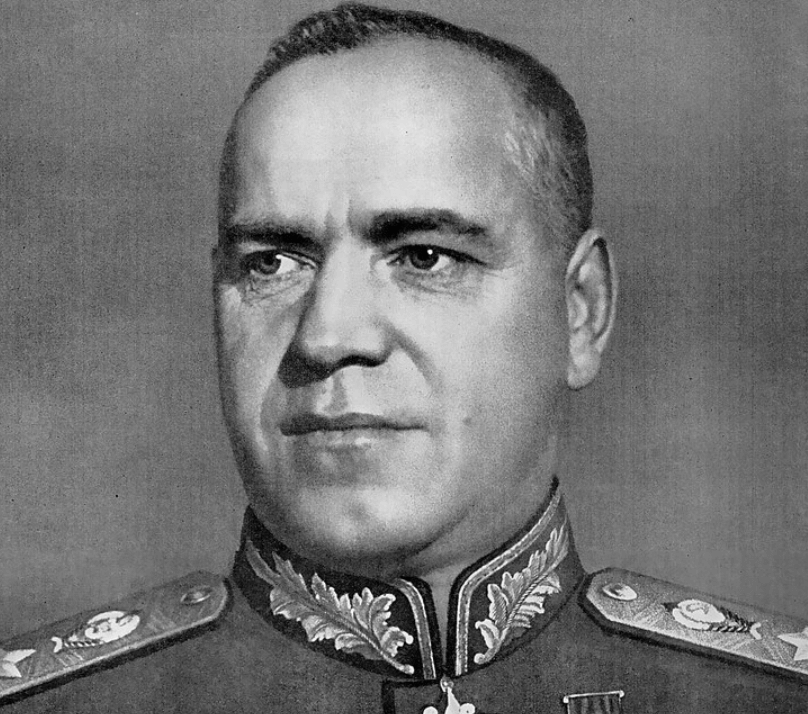Who was Georgy Zhukov? Information on Soviet army officer Georgy Zhukov biography, life story, military career and facts.

Georgy Zhukov (Source : wikipedia.org)
Georgy Zhukov; Soviet army officer: b. Kaluga Province, Russia, 1896; d. Moscow, June 18, 1974. The son of peasants, he became a private in the Imperial Russian Army in 1915. By 1917 he had advanced to sergeant and had twice been decorated with the Cross of St. George. After the Russian Revolution, he joined the Red Army (1918) and served throughout the civil war as an officer of cavalry. Zhukov attended the Frunze Military Academy (1928-1931) and thereafter became the commander successively of a cavalry regiment, a division (1934), and a corps (1936). During this period he was closely associated with Gen. (later Marshal) Semyon K. Timoshenko and took a leading part in the development of the Soviet armored forces.
In January 1940 Zhukov was appointed chief of staff of the Soviet forces in the final stages of the Russo-Finnish War. He was promoted to army general in May 1940 and became chief of staff of the Red Army, vice commissar for defense, and an alternate member of the Politburo in January 1941. He was active in the sweeping reorganization and retraining of the Soviet Army that followed the Finnish war.
After Adolf Hitler invaded Russia in June 1941, Zhukov took part in defensive operations on the central and Leningrad fronts as representative of the High Command. In October 1941 he was appointed to command the reserve forces that were being massed for the defense of Moscow, and he brought the German offensive to a halt in December of that year. Meanwhile the Headquarters (Stavka) of the Supreme Command had been organized, and Zhukov became 1st deputy commissar for defense and—under Joseph Stalin’s over-all direction—the virtual chief of the Soviet war effort, aided by the 2d deputy commissar for defense, Gen. Aleksandr M. Vasilevski. In 1942 he personally organized the great counteroffensive at Stalingrad and subsequently the operations that resulted in the relief of Leningrad; for these services he was promoted to the rank of marshal of the Soviet Union. His final front command of the war was the great offensive against Berlin (1944-1945).
After World War II Zhukov commanded the Soviet occupation forces in Germany (1945-1946) and in 1946 was recalled to Moscow as deputy minister of defense and commander in chief of the ground forces. A few weeks later he was relieved of these posts and ordered to an obscure command at Odessa, apparently because of Stalin’s jealousy of his military reputation. Late in 1952, however, Zhukov was suddenly and secretly reinstated in both the posts from which he had been dismissed, for reasons never clearly revealed.
On the death of Stalin, in March 1953, he played a prominent part in the arrest and overthrow of Lavrenti P. Beria, the head of the secret police; the army now became a powerful political force, and in February 1955 army support headed by Zhukov was responsible for Nikita S. Khrushchev’s political triumph over Georgi M. Malenkov, Zhukov becoming minister of defense. In June 1957 the revolt of Vyache-slav M. Molotov and Malenkov against Khrushchev was crushed by Zhukov, who boldly told the Central Committee that the armed forces would not “permit anyone to bid for power.” Zhukov was now made a full member of the party Presidium, the first Soviet professional soldier ever to reach that eminence. In October 1957, however, he was ousted from this and all other political positions and again relegated to obscurity, ostensibly for trying to limit the control of the party organization over the armed forces.
After the ouster of Khrushchev in 1964, Zhukov was allowed to return to public life once again. He made appearances at military functions, and his wartime memoirs, Toward Berlin, were published in the official magazine of the Soviet ministry of defense.